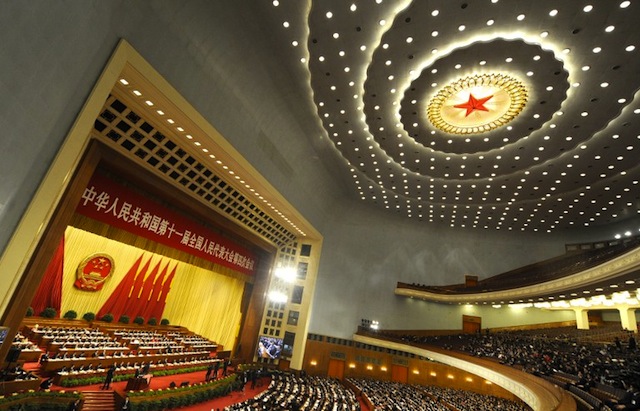SUMMARY
This is AI generated summarization, which may have errors. For context, always refer to the full article.

BEIJING, China – China’s all-powerful Communist Party opens its 18th congress on Thursday, November 8, amid smothering security to unveil a new slate of leaders who will oversee the world’s number two economy for the next decade.
The 5-yearly meeting starts with a nationally televised address by President Hu Jintao, who is set to hand over the party’s leadership – the apex of power in the country of 1.3 billion people – to Vice President Xi Jinping.
More than 2,200 delegates drawn from the Communist Party’s ranks of 82 million members will gather in Beijing’s Great Hall of the People next to Tiananmen Square until November 14, when the new leaders will be presented.
Underlining the party’s secretive nature, the closing date was only announced on the eve of the meeting, and many Chinese netizens remarked on the contrast with the very public re-election of Barack Obama as US president.
“(The congress) will be one of great importance, when China is in a crucial stage of building a modern and prosperous society in all respects, taking on reform and opening up, and accelerating the transformation of the growth pattern,” party spokesman Cai Mingzhao said at a press briefing.
But Xi will inherit Hu’s job of Communist Party general-secretary at a moment when the party’s key claim to legitimacy – economic growth – is threatened by a rare slowdown, and its unity shaken by a top-level scandal.
The murder and corruption scandal surrounding former regional boss Bo Xilai, who has been ejected from the party and is now awaiting trial, exposed divisions in the leadership and related back-room jockeying for top positions.
With the dates of the stage-managed congress now confirmed, the party elite appear to have settled on the new leadership line-up in the Politburo Standing Committee, China’s highest decision-making body.
The committee will be steered by Xi, 59, the son of a respected figure in the revolution that brought the communists to power in 1949 who has previously headed some of China’s most economically dynamic and reform-minded areas.
But even the best-informed China-watchers say relatively little is known about Xi and how he will confront challenges facing the nation both at home and abroad, as it increasingly challenges the United States in various arenas.
Security lockdown
Few expect Xi’s ascent to be thwarted, and after taking the party’s helm he will be installed next March as China’s state president in place of Hu. But ahead of the congress, authorities were taking no chances.
Areas of central Beijing near the Great Hall of the People were swarming with police, and authorities have reportedly taken such measures as banning sales of knives and even ping pong balls, for fear they might be used to spread “reactionary” messages.
Hundreds of activists have been put under house arrest, rights groups say, while taxi drivers have been told to lock their back windows apparently to prevent passengers from throwing out flyers with political messages.
A state-run newspaper published a survey Wednesday suggesting 8 out of 10 Chinese in major cities want political reform, adding to mounting calls for change of some sort in how the corruption-ridden Communist Party runs China.
The contrast with how the United States manages its political affairs was laid bare with Obama’s triumph over Mitt Romney, and did not go unnoticed among commentators on China’s wildly popular social media websites.
The interest of ordinary Chinese in the US election had reached a “new high,” one posting said, because “the Chinese people have given up their own affairs… they are not allowed to handle them!” – Kelly Olsen, Agence France-Presse
Add a comment
How does this make you feel?
There are no comments yet. Add your comment to start the conversation.